Pope Francis

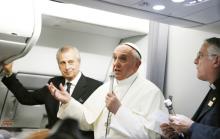
With his open and easygoing manner, Pope Francis charmed the media as much as the faithful during his successful visit to Brazil, the first international pilgrimage of his pontificate.
But it was the pope’s remarks about gay priests, made during a free-wheeling press conference on the return trip to Rome, that drew the most headlines, raising questions about whether the pontiff was signaling a change in the church’s approach to this volatile issue.
When asked by reporters about rumors of a “gay lobby” of clergy in the Vatican who were exposing the Holy See to blackmail schemes and scandal, Francis at first joked that while there’s a lot of talk about such a lobby, “I have yet to find on a Vatican identity card the word ‘gay.’”
Then, in a more serious vein, he added:
“I think that when we encounter a gay person, we must make the distinction between the fact of a person being gay and the fact of a lobby, because lobbies are not good. … If a person is gay and seeks the Lord and has good will, who am I to judge that person?”
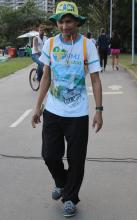
A record-breaking three million Roman Catholics crammed Copacabana Beach Saturday night to hear Pope Francis encourage young people to build a better world.
The pope might have been talking about Fabio Mateus.
The 38-year-old married father of twin boys, made an extraordinary effort to see the pope. Saturday night he and millions of others slept on the beach following the vigil and watched the pink hue of dawn breaking on the Atlantic horizon.
Pope Francis announced Monday in an airborne news conference that he’s ‘not one to judge’ the sexual orientation of Catholic priests. On his journey home from Brazil, Pope Francis declared open-mindedness by sharing his support on behalf of the gay community. The Washington Post reports:
“If someone is gay and he searches for the Lord and has good will, who am I to judge?” Francis asked.
Read more here.
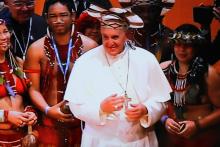
In one of the most inclusive gestures of his visit here, Pope Francis donned a headdress offered to him from an indigenous South American Indian at a ceremony in the city´s grand municipal theater.
The gesture was greeted with shouts of surprise initially. Then the audience of Brazilian politicians and business people erupted into roars of approval and thunderous applause.
It was a compelling moment. Moments earlier, the pope had spoken about the state´s responsibility to respect and encourage “peaceful coexistence between different religions.”
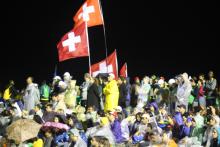
It’s not every day that the pope drops in for a visit to your home. But Maria da Penha dos Santos lucked out when Pope Francis chose to enter her small yellow two-story house in the rundown slum of Varginha.
The Thursday morning visit came on the fourth day of the pontiff’s weeklong World Youth Day tour. Santos’ house was one of seven earmarked for a visit.
She was waiting outside with her husband, daughter, and granddaughter when the pope stopped in front and told her “we have a beautiful family and he had loved us even before we had met.”
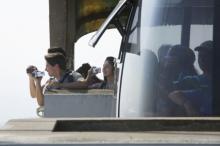
Pope Francis spent Tuesday resting following his arrival here in his first international trip as pope during which his car was mobbed by throngs of well-wishers who excitedly closed in on his convoy and prevented the pontiff from reaching his reception ceremony on time.
His arrival animated tens of thousands of young Catholics cramming the Rio city center, as they waved flags, chanted slogans, and swarmed the four-door Fiat he was riding in.
“It was so amazing when he was selected, we just couldn’t believe it. We cried and hugged one another,” Alicia Velazquez said. “I personally want to see if he’s still the same man as simple and humble whom we all knew. I have faith that he’s remained the same.”
Francis’ driver missed lanes that had been cleared on a boulevard, taking the car down a lane that was not lined with fencing and with no uniformed police in sight to control crowds.
Dozens of Vatican and Brazilian plain-clothes security officials had trouble keeping the crowds back but it did not appear to bother Francis. The bulletproof popemobile was left in Rome.
Francis rolled down his back-seat window, waved to the crowd, and touched those who reached inside. He kissed a baby a woman handed to him.
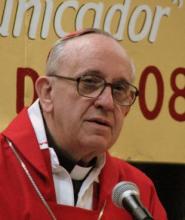
Six years ago, then-Cardinal Jorge Bergoglio of Buenos Aires attended a gathering of Latin American bishops at the Marian shrine of Aparecida in Rio de Janeiro and called for the Roman Catholic Church to go toward the “outskirts, not only geographically but … existentially.”
Two years after the 2005 papal conclave where Bergoglio was the runner-up to Pope Benedict XVI, the speech helped raise his profile as a man to watch.
Next week, Bergoglio will return to Aparecida and Rio, this time as Pope Francis. Though he won’t visit his native Argentina, the visit will draw attention to Latin America’s first pope and his appeal for a poor church that eschews worldly power.
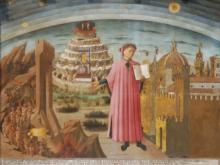
Following Pope Francis’ Twitter feed may be good for your soul — both in this life and the next.
The spiritual leader of the Roman Catholic Church plans to grant plenary indulgences by Twitter during the World Youth Day, which will be held July 23-28 in Brazil.
The indulgences, which Catholics believe can reduce the time a soul spends in purgatory, will be available to Francis’ nearly 7.5 million Twitter followers in all languages — if they tune in to World Youth Day broadcasts or take other spiritual actions. To get an indulgence, Catholics must have already had their sins absolved by a priest.
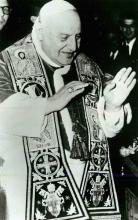
When the Vatican announced this month that Pope Francis would formally elevate Popes John Paul II and John XXIII to sainthood, two things stood out.
For John Paul, it was the record speed that he reached sainthood, just eight years after his death. The only other saint to be canonized so quickly in modern times was Opus Dei founder Josemaria Escriva, whose sainthood bid took 27 years.
But for John XXIII, Francis decided to waive the church law that requires a second miracle in order to be named a saint. Asked how John XXIII could be named a saint without the required second miracle, the Vatican’s chief spokesman said “no one doubts his virtues.”
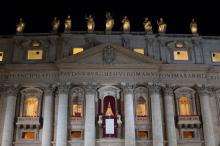
Pope Francis on Thursday approved a major overhaul of the Vatican’s criminal laws, introducing specific offenses for child sexual abuse and leaking confidential documents.
Vatican laws against money laundering, corruption, and the financing of terrorism were updated to respond to the recommendations of the European financial transparency watchdog Moneyval. The Vatican submitted to Moneyval oversight as part of its bid to use the euro as its currency.
Under the new norms, which will go into effect on Sept. 1, the Vatican also abolished life imprisonment, substituting a maximum jail term of 30 to 35 years.
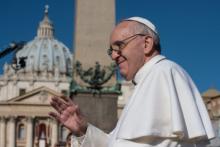
In his first official trip outside Rome since his election, Pope Francis visited the tiny island of Lampedusa off the coast of Sicily on Monday, hoping to show solidarity to African migrants who risk their lives trying to immigrate to Europe.
Set only 70 miles from Tunisia, the Italian island of Lampedusa is the first port of safety for the thousands of undocumented migrants and asylum seekers who risk their lives every summer trying to reach Europe on small, rickety boats.
Francis said the frequent news reports on the deaths of the people who were trying to make the crossing had been like “a thorn in the heart” for him, and called on society to overcome what he called “the globalization of indifference.”

Pope Francis declared on Friday that Popes John Paul II and John XXIII will be made saints, elevating the two most decisive popes of the 20th century to the pantheon of Catholic life and worship.
In a sign of the worldwide devotion for John XXIII, known as “Good Pope John,” Francis waived the requirement for a second miracle credited to John XXIII’s intercession, with the Vatican’s spokesman saying, “no one doubts his virtues.”
Francis signed off on a decree recognizing the second miracle attributed to the Polish-born John Paul II, who reigned from 1978 to 2005 , and is credited with globalizing the papacy and playing a key role in the downfall of the communist regimes of Eastern Europe.

Two top managers of the Vatican Bank resigned on Monday, just five days after Pope Francis appointed an independent commission to conduct a top-to-bottom review of the scandal-plagued bank.
The surprise resignation of the bank’s director general, Paolo Cipriani, and of his deputy, Massimo Tulli, follows the arrest of a senior Vatican official with close ties to the bank who was charged on Friday with attempting to smuggle 20 million euros into Italy from Switzerland.
Cipriani, 58, served as the bank’s director general since 2007 and will be replaced on an interim basis by the bank’s president, German financier Ernst von Freyberg, who was appointed last February in one of Pope Benedict XVI’s last official acts.
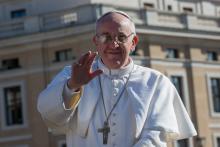
In his first official meeting with a Jewish delegation, Pope Francis on Monday reaffirmed the Catholic Church’s condemnation of anti-Semitism and vowed to further deepen Catholic-Jewish relations.
“Due to our common roots, a Christian cannot be anti-Semitic!” he told a delegation of the International Jewish Committee for Interreligious Consultations, the Vatican’s official partner for interfaith dialogue with the world’s Jews.
In his speech, Francis stated that the church condemns “hate, persecution, and all manifestations of antisemitism.”
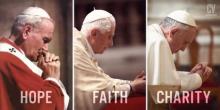
As a millennia-old institution, the Vatican is accustomed to change at a glacial pace. But in the eyes of many outside the church — and even of some within it — the arrival of Pope Francis on the throne of St. Peter seems to have started nothing short of a revolution.
Even Francis himself, in his speech to Rome’s diocese on Monday, said that Christians not only can, but should, be “revolutionaries.”
Now, 100 days into his pontificate, a debate is brewing in Rome over whether Francis has set a distinctly different course from his predecessor, or whether the visible differences in style and personality between Francis and Benedict XVI mask a deeper theological and ideological continuity.
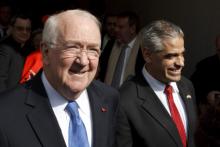
President Obama on Friday nominated Ken Hackett, former head of Catholic Relief Services, to be the next U.S. ambassador to the Vatican.
It’s a savvy move, picking a Catholic whose career in the church has been dedicated to alleviating suffering as America’s representative to a pope who has made helping the poor a priority for his pontificate.
Hackett replaces Miguel Diaz, who left the post last November to teach at the University of Dayton. Diaz is a theologian, which was a first for the U.S. ambassador to the Holy See, and that also seemed to make sense in that Pope Benedict XVI, whose retirement led to the election of Pope Francis last March, is a renowned theologian.
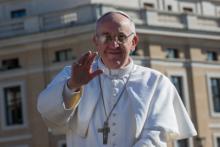
When Pope Benedict XVI shocked the world in February in becoming the first pope to resign in 600 years, he left behind a Roman Catholic Church weakened by scandals, beset by infighting and suffering from a general sense of isolation from the modern world.
Three months after the election of Argentine Cardinal Jorge Bergoglio as Pope Francis, much of the gloom seems to have lifted.
St. Peter’s Square is again a magnet for legions of pilgrims, and the communications problems that dogged Benedict’s papacy have receded. Francis’ simpler, direct style, together with his focus on the poor and the marginalized, has captivated the world.
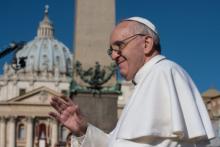
Pope Francis and Archbishop of Canterbury Justin Welby will meet in Rome on Friday for the first time since the two men took office in March.
Francis was inaugurated as the head of the world’s 1.2 billion Roman Catholics on March 19, while Welby officially took over as Archbishop of Canterbury and spiritual leader of the 77 million-member Anglican Communion on March 21.
Some hope the meeting could put Anglican-Catholic relations on a firmer footing.
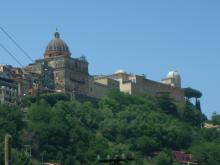
Breaking with another centuries-old tradition established by his predecessors, Pope Francis will remain in Rome during the summer and endure the usually stifling heat of the Eternal City.
The Vatican’s chief spokesman, the Rev. Federico Lombardi, announced on Thursday that the pope will not move to the papal villa of Castel Gandolfo, where previous popes usually spent at least part of the summer.
The villa, boasting expansive gardens, a working farm, and a private helipad, was a favorite retreat of Francis’ predecessor, Benedict XVI, who used to spend three months there, from early July to the end of September.
On Wednesday during his weekly address, Pope Francis condemned consumerism and the "culture of waste" especially pertaining to food. Wednesday was also the day the United Nations launched an anti-food waste campaign to mark World Environment Day. The UN’s Food and Agriculture Organizatio estimates 1.3 billion tons of food are lost or wasted every year. The Washington Post reports:
“Throwing away food is like stealing from the table of those who are poor and hungry,” he said during his weekly audience in St. Peter’s Square.
Read more here.